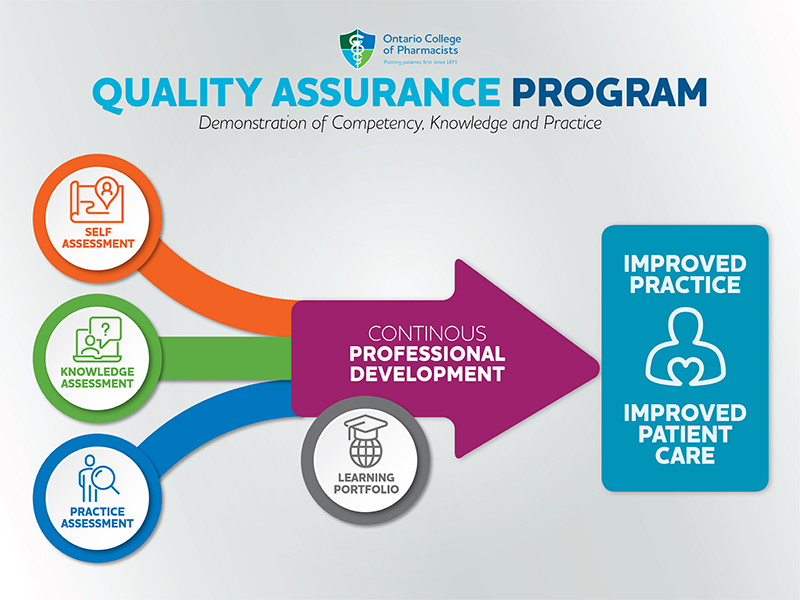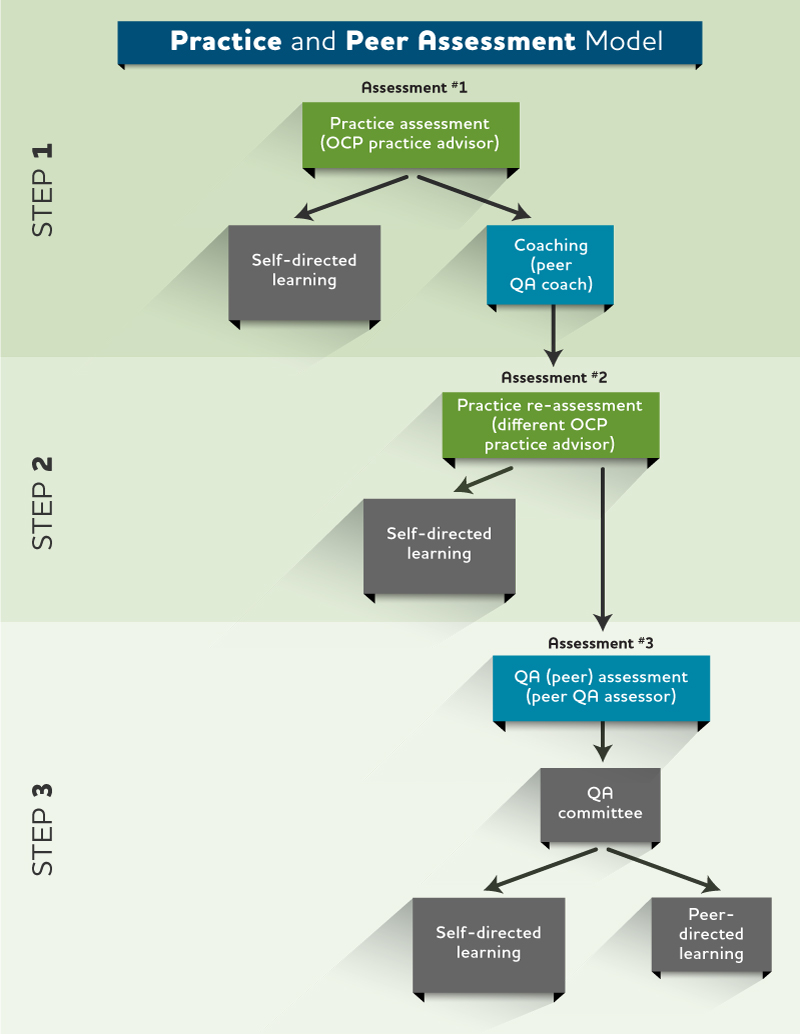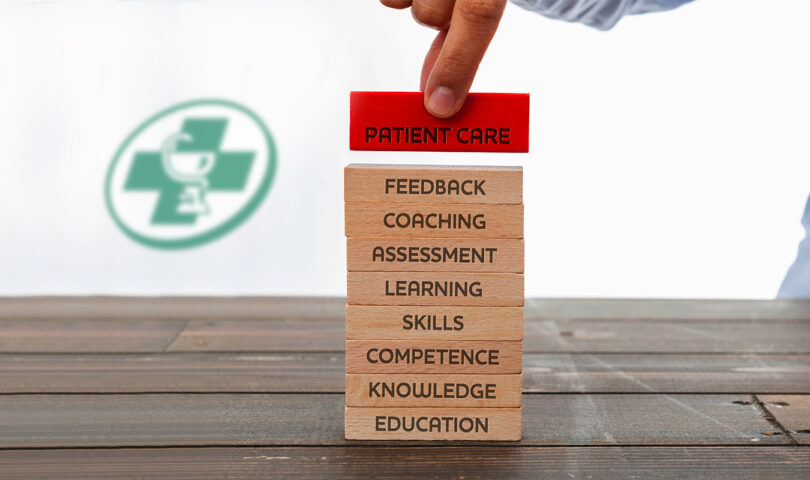The role of quality assurance is to ensure that pharmacy professionals maintain appropriate skills and knowledge throughout their career. It is meant to be educational and collaborative, not punitive, and benefit both patients and pharmacy professionals.
For pharmacists and pharmacy technicians it is intended to:
- validate the things they are already doing well,
- help them identify areas for improvement in their practice in order to better support their patients, and
- support ongoing skill and knowledge development at all levels of their career.
Quality assurance is also a major component of the College’s role in protecting the public and promoting continued competency by evaluating pharmacy professionals against the standards of the profession. It focuses on specific performance indicators that have a significant impact on patient care.
Quality assurance is a confidential process where results are not shared with employers, owners, colleagues or any College committee, other than the Quality Assurance Committee.
COMPONENTS OF QUALITY ASSURANCE
The College’s Quality Assurance Program consists of four major components: a self-assessment, a knowledge assessment, a practice assessment and a learning portfolio. While the self-assessment, the knowledge assessment and the practice assessment are coordinated by the College, pharmacy professionals are expected to engage in continuous professional development and keep their learning portfolio up to date on an ongoing basis.

Self-Assessment: Identifying Learning Needs
The self-assessment is a tool that assists registrants in identifying their learning needs (both those to maintain competency and those to advance professionally) and creating a plan for learning.
Every year, 20% of pharmacists in Part A of the Register and pharmacy technicians will be randomly selected to complete the self-assessment Tool. Although registrants are only required to complete the self-assessment once in every five-year cycle, voluntarily completing the assessment on a yearly basis is encouraged.
Knowledge Assessment: Assuring Current Knowledge and Skills
The knowledge assessments for pharmacists and pharmacy technicians are currently under development, with knowledge assessments for pharmacists expected to begin in 2021. The blueprint for the upcoming knowledge assessment will cover topics on ethics/professionalism/jurisprudence and knowledge transition, in addition to clinical knowledge.
Practice Assessment: Evaluating Performance
A practice assessment is an evaluation of an individual Part A pharmacist’s or pharmacy technician’s performance. The practice assessment occurs in the place of practice with a College practice advisor. Starting January 2020, practice assessments are separate and distinct from pharmacy operational assessments.
Practice assessments of pharmacists support their role as medication experts and clinical decision-makers, and are consistent in approach to assessments of other primary healthcare practitioners. Practice assessments of pharmacy technicians support their technical role within the pharmacy/organization.
During a practice assessment, practice advisors use the practice assessment criteria to evaluate a registrant’s practice. For the community pharmacist practice assessment this includes four domains: patient assessment, decision making, documentation, and communication and education. For the pharmacy technician practice assessment this also includes four domains: patient care support activities, collaboration and decision making, documentation, and communication and education. It is important to note that practice assessments are intended to evaluate the registrants’ processes in place for each of the domains.
Throughout and following the assessment, the practice advisor provides feedback outlining areas of practice where the pharmacy professional is doing well and meeting standards as well as areas where there is an opportunity for improvement. They offer support through coaching and conversation, pointing out opportunities to enhance practice, probing the thinking behind certain actions and decisions, and indicating where to access helpful resources.
With an emphasis on education, the goal of the practice assessments is to increase adherence to practice standards, help pharmacy professionals practice to their full scope, and ultimately support optimal health outcomes. Routine practice assessments are scheduled every four to six years.
If a pharmacy professional does not meet the standards indicated on their first assessment, he/she is given the opportunity to spend time with a quality assurance coach (peer practitioner) who can provide support specifically in areas where there is room for improvement. Following that session, the pharmacy professional will be reassessed by another practice advisor.
If there are still significant areas of practice that require improvement following this second assessment, a QA assessment will take place and the results will be sent to the Quality Assurance Committee for consideration. The committee may provide recommendations to help the professional meet standards by identifying appropriate remediation, always recognizing that patient safety is the first priority (see flowchart below for an overview of the process).
Practice assessments are currently ongoing for pharmacists in community practice and for pharmacy technicians in community and hospital practice. Assessment tools for pharmacists in non-community settings (including hospitals) are currently under development, with a pilot expected in the Fall of 2020.

Learning Portfolio: Supporting Ongoing Development and Reflecting Learnings From the Other Quality Assurance Activities
All registrants of the College are expected to engage in continuing professional development, regardless of whether electing into Part A or Part B of the register, throughout their career. A record of learning must be maintained, either through the College’s My Learning (CPD Portal) or through another method. Records of activities are required to be retained for five years. Some types of activities that registrants may wish to document include, but are not limited to, workshops, self-study courses, reading articles or studies, exploring or discussing an issue with colleagues, or other activities that meet their practice and personal goals.
PREPARING FOR QUALITY ASSURANCE ACTIVITIES
Many registrants express concerns when contacted by the College to participate in any of the above quality assurance activities. Pharmacy professionals are encouraged to review the College’s resources on the quality assurance components, available on the OCP website, to not only feel more prepared in advance of the activity, but also to support ongoing learning and development throughout every year of their career.
- Learn more about Practice Assessments, review the Practice Assessment Criteria for Community Pharmacists or the Practice Assessment Criteria for Pharmacy Technicians, including using the Guidance section to self-assess current practice and identify opportunities, and read the Practice Assessment Resources.
- Complete the Self-Assessment Tool on a yearly basis through the My Learning (CPD Portal). Although, the College only requires registrants to complete this once in every five year cycle, completing it more frequently will help to determine a plan for learning, as well as provide familiarity with the tool in advance of this request.
- Whether using the My Learning (CPD Portal) or another method, update the Learning Portfolio on a regular basis. Ensure that the records and supporting documents are retained for at least five years.
IMPORTANT MESSAGES ABOUT PRACTICE ASSESSMENTS
PHARMACISTS (PART A) AND PHARMACY TECHNICIANS: PLEASE UPDATE YOUR DESIGNATED PRACTICE ASSESSMENT SITE IF YOUR PRACTICE LOCATION CHANGES
For the purpose of your practice assessment, part A pharmacists and pharmacy technicians are required to identify a place of practice in Ontario where they are providing patient care. This is called a Designated Practice Assessment (DPA) Site, and may be the same, or different, from your primary place of practice.
It is imperative that your DPA Site is updated in OCP’s Online Services portal if it has changed. You are now able to change your DPA site at any time online.
It’s important to ensure this information is up-to-date as the College and practice advisors depend on the accuracy of this information to facilitate your practice assessment in the location where you provide patient care.
REORGANIZATION OF ASSESSMENT TEAMS ENHANCES FOCUS ON OPERATIONAL AND PRACTICE ASSESSMENTS
As of January 1, 2020, the Assessment Team at the College has reorganized into three teams with a more specific focus in order to help improve your experience and better support your practice:
- Hospital Pharmacy (operations) Assessments
- Community Pharmacy (operations) Assessments
- Practice Assessments (hospital and community based assessments of individual registrants’ practice)
What Does this Mean for You?
Pharmacy (Operations) and Practice Assessments will be completely separate and distinct, both in terms of day and time. This includes the fact that there will be a separate Hospital Operations Advisor and Hospital Practice Advisor (for Hospitals) or Community Operations Advisor and Community Practice Advisor (for Community Pharmacy) who will schedule and conduct your Pharmacy (operations) and Practice Assessments, respectively.
Visit our website to learn more about the College’s practice assessments and operations assessments. If you have any questions, please email ocpassessments@ocpinfo.com.













